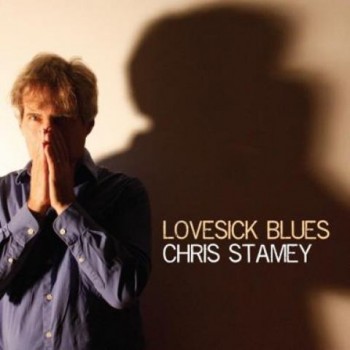—-> VIA HUFFINGTON POST
A Conversation with Chris Stamey
Mike Ragogna: Chris, you’re coming off of a dB’s record that everybody loved, Falling Off The Sky. Did that creatively propel you into Lovesick Blues?
Chris Stamey: It seems like a continuum to me, but there was a point on the dB’s record–the song called “She Won’t Drive In The Rain Anymore” and a tune called “The Adventures Of Albatross and Doggerel”–where they both seemed to me something that wasn’t in the usual vocabulary of Studio Technicolor. I think those, particularly Peter’s song “She Won’t Drive In The Rain Anymore,” got me back thinking about the way strings sound, and then I was also writing up some arrangements during that period for a live performance of some Big Star songs. I really like those flavors. But I don’t think that the dB’s record really inspired this one.
MR: Lovesick Blues seems to be an appropriate title for what’s going on because of the sometimes haunting arrangements, titles, et cetera. Was it personal relationships that inspired the material?
CS: Well, I can give you an answer that’s not the most dramatic answer, but it’s the actual answer. I’ve been very fortunate to be happy in love for quite a while. I’ve been very happily married down here in North Carolina, and it has always seemed a little disingenuous to write heartbreak songs, although I did develop a certain flair. I did write some of those early in my songwriting career. But I actually heard Nick Lowe talking on the radio with Terry Gross and she was saying, “Well, Nick, all these sad songs,” and he was saying, “You know, I don’t feel that way, but I remember what it was like to feel that way.” I found that sort of empowering, that it seemed okay to go there even if I’m not living my life in that kind of way.
MR: Yeah, exactly, you don’t have to be going through that exact scenario to understand it, especially when you have a life’s worth of experiences to pull from.
CS: Yeah. With the song “Lovesick Blues,” I was just in a period where I had time to write. I had a friend who more or less died of grief after having lost someone he loved, and so that was something I was thinking about, about how he felt. Once I had that song, I talked with Jeff Crawford about where the recording should go. We picked the songs I’d written and we also looked back to some older songs and tried to put together a record that would not try to be all things to all people, but would work as one listening experience. I think, in the end, we broadened it. At the very last minute, I wrote “Astronomy” when the record was almost finished. I wrote that for another band I’d been playing with called The Fellow Travelers and kind of stole it for my record. Also, with “You n Me n XTC,” I guess the people driving in the car to that song are not always happy, but it’s a pretty jolly tune.
MR: [laughs] I was going to ask you about that song. Based on a real road trip?
CS: It actually wasn’t. I’d always liked the pun of ecstasy and XTC, and there was a way of bringing that up. But no, I had a lot of friends who really thought XTC was a touch point. I never knew much about the band beyond the first singles that I’d hear in clubs in New York. Then I did work on a record with Peter Blegvad, a songwriter in England, and Andy Partridge worked on some of the record, who’s a really cool and really musical guy. I grabbed the term “XTC” like Bon Iver might have said “Bruce Hornsby.” I thought it might be something that people might bond over in some weird way.
MR: Chris, the concept of “Skin”–being in your skin, being in my skin. Can you go into maybe what inspired it?
CS: I’m not sure how you say it, but Borges, the idea of magical realism…I really liked that. You’re writing in a realistic way, but there is something that’s not actually what happens. So I was thinking about magical realism and also the Bible saying, “Do unto others as you would have them do unto you.” I thought, “What if we could actually do that?” I just tried to imagine what it would be like, to really see yourself as the other person sees you. Most of my songs don’t have great backstories, they’re kind of what’s there is in the song. I like to think that one’s clear enough and literal enough that it makes sense. But I really like the line about “our fingers move like mice,” because that seems like if you were in somebody else’s body, you would try to move their fingers.
MR: You co-produced this record?
CS: Jeff Crawford produced it. I did the arrangements.
MR: What is your headspace when you’re writing for yourself as opposed to when you’re writing for the dB’s or your other musical affiliations?
CS: Well, where you’re going with this is thinking about “trying” to write songs, but I don’t think you really try. I think you prepare the ground and then you’re just up one morning and the light’s in a particular way, and then fifteen minutes later, you have a song. Maybe there were ten or twenty years of figuring out how chords work and how words work, but “trying” to write a song sounds like really hard work for me. It’s like you have to NOT try, I think. But if I’ve got something coming up, then I just want to keep it in the back of my mind, and then when the light’s right, I can write a song. It doesn’t take very long. I appreciate that there are people who work really hard at it, but the idea doesn’t fit with the way it works for me, although I will say that sometimes, I think I’ve just spent fifteen minutes on it and it’s really been four or five hours. Time gets funny when you’re doing something creative.
MR: Your press release quote for Lovesick Blues read, “I think the album is mostly about people who are haunted, perhaps by the past, perhaps sickened or saddened by love in some cases.” The Chris Stamey then and the Chris Stamey now, what do you think is the major difference between you two creatively?
CS: When I started out, I would go out into the woods where nobody could hear me and I would try my hardest to write songs like Ray Davies over and over. I don’t try to do that anymore. I think that when I was a kid and was first trying to write music, I would sit at a really nice piano and write what I thought of as classical pieces, although they weren’t really. They were instrumental. I started out writing instrumental music for a long time, and then doing the songs, I would try to write a song like somebody else. Then I wrote a few that just kind of came to me and I kept doing it in the way that they came to me, so it was a division between doing something as an exercise and then doing it as an expressive effort. I think once I started doing that, what got better was the self-editing. The first record that came out of my songs was a seven-inch by a band called Sneakers and I think those are not bad songs, it’s just that every one of them has a few lines that weren’t truthful or were falsely clever and I should have thrown those lines out. Now, I would throw them out. I wouldn’t even put them in. But essentially I don’t hear much difference between that record and anything.
MR: Yeah.
CS: Writing instrumental music is different. That I have to walk around a long time and I hear it kind of swirling around, and I sit in noisy places so that my ears can have the kind of agitation that lets you hear textures, so that’s harder work.
MR: Do you the have to run to the computer or notebook or score paper to notate what you’re hearing?
CS: No, I don’t have to run.
MR: [laughs] My real question there is how do you retain what you hear and create as it’s happening. How do you remember it?
CS: Well, I just retain the amount I do retain and I figure that what I forget wasn’t so hot.
MR: Chris, what advice do you have for new artists?
CS: There would be a lot of things. One thing I would say maybe is learn–in Nashville it’s called the number system–learn how the chords function, not just what the chords are, so that you know if you’re in the key of G and you put in an F chord, that’s the flat seven chord and you know its relation to the key you’re in. You can save a lot of time. You think you’re writing a different song when really it’s the same progression, you’ve just moved the capo around. I was very thirsty for music theory when I was growing up. It was taught in high school and now it’s probably not, but that’s a good thing to do. Try to know intuitively where you’re going in the scale or harmonically. I also feel that you always think when you’re writing a song, “Wow, this is easy, I’ve got to go run to the post office, but I’ll come back and it’ll still be so easy,” but it won’t be. It’ll just be gone. Part of the thing if you’re really going to work at it is you don’t get that letter mailed. You always think that second verse or the bridge is going to be easy to write when you’re in the heat of it, but if you don’t honor that brief feeling with the attention it deserves, it will be gone, and that second verse will just be hellacious to write. Those are two pragmatic soapboxes that are easy for me to get on.
MR: Awesome. What else you got?
CS: I would also say try to go different places in your songs. Learn how to modulate, it’s a really powerful way to do, instead of just stepping on an effects pedal and making it go louder or quieter, go somewhere harmonically. Let your melodies go places you don’t expect.
MR: Are you going to be on tour?
CS: Well, since I have scores for just a little group–four string players, and for like a fifteen-piece chamber orchestra–I’m planning on trying to find people who want me to play and I’ll just go there and use local players and not just hope that the clarinet player remembers the crescendo tomorrow.
Read the full interview HERE on Huffington Post.
Tags: Chris Stamey, Huffington Post, Lovesick Blues, Mike Ragogna
